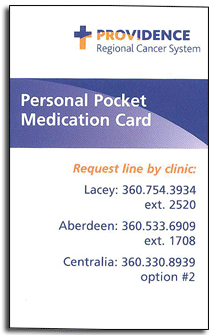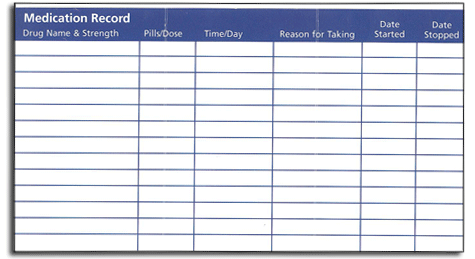"I take one blue pill and three pink pills twice a day."
 You would be surprised to learn just how often our clincial staff hear those same exact words. Or maybe, "I take 10 mg every day for my blood pressure." Our next question is almost always, "10mg of what?"
You would be surprised to learn just how often our clincial staff hear those same exact words. Or maybe, "I take 10 mg every day for my blood pressure." Our next question is almost always, "10mg of what?"
It may not seem like a big deal but the importance of knowing the medications you are on can never be stressed enough. With thousands of drugs being prescribed every day, not to mention the availability of natural remedies you can understand how confusing it may be for us to narrow down your drug just by color or mg. So why do we care? Medication reconciliation helps us to optimize the drug therapy you are on while also reducing the adverse side effects that can occur when two drugs are mixed (ie: taking St. John's Wort during chemotherapy reduces the effectiveness of the chemotherapy).
What falls under the category of things we want to know about?
- Prescription medications (including any sample medications you have been given)
- Vitamins
- Over-the-counter drugs
- Vaccines
- Diagnostics and contrast agents
- Radioactive materials
- Respiratory therapy-related medications
- Blood derivatives
- Intravenous solutions
- Any other produt the FDA has designated as a drug
In all honesty, if you're putting it in your body we want to know about it. Need a place to put it all? You can pick up a personal pocket medication card in any of our clinics or you can request we mail you one by sending us your address.
 The inside of the "Personal Pocket Medication Card" provides space for you to write all the information your care team needs.
The inside of the "Personal Pocket Medication Card" provides space for you to write all the information your care team needs.



 Providence Regional Cancer System
Providence Regional Cancer System
Reader Comments (2)
Our experience this past year is that the need to provide the list of medicines is frequent. That during chemo medications can change up quickly. So, to keep accuracy and simplicity; we keep an excel document with all the information about medications and carry it with us so we can simply attach it to paperwork with each doctor visit, clinic or test provider.
Mary,
What a great idea, and one I'm sure your care team appreciates. Thank you for sharing.